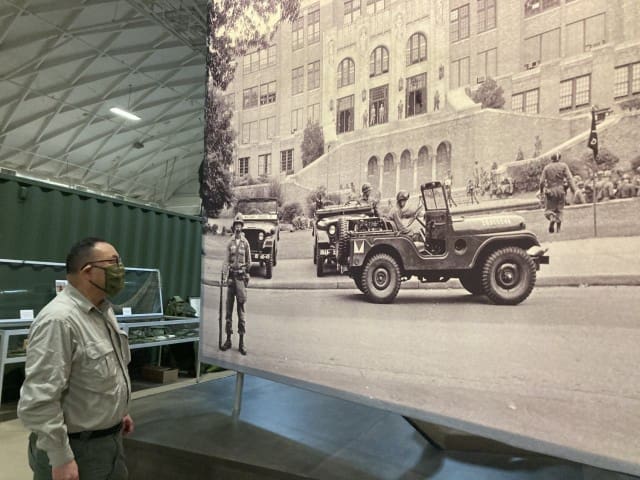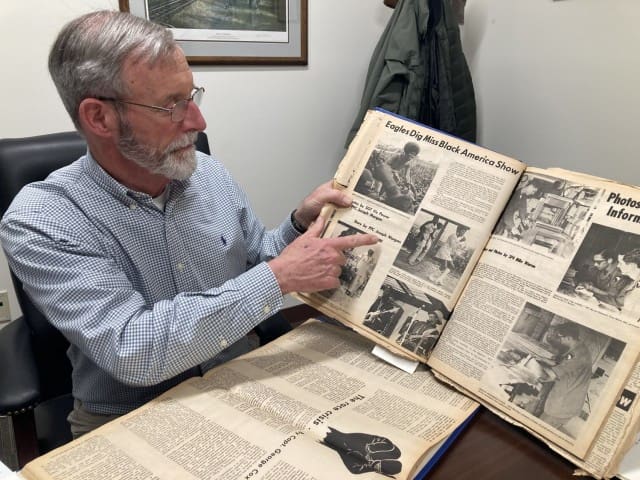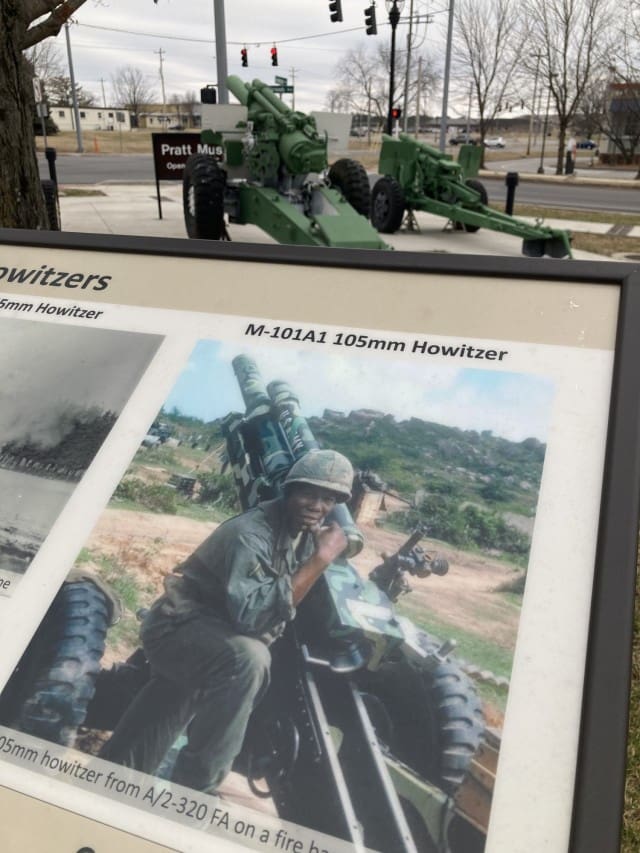FORT CAMPBELL, Ky. – When the 101st Airborne Division needed big guns at the Battle of the Bulge, two corps artillery units of Black Soldiers delivered.
When the Little Rock Nine needed escorts just to attend Central High School in Little Rock, Arkansas, President Dwight D. Eisenhower sent in 101st Abn. Div. Soldiers from Fort Campbell.
And when the odds were stacked against them, two Black Soldiers from the 101st Abn. Div. risked it all to save others.
These were all touchstones in the history of the 101st Abn. Div. (Air Assault), the United States Army and nation’s progress in race relations over the years, said John O’Brien, director of the Brig. Gen. Don F. Pratt Memorial Museum.
As the Army celebrates Black History Month, O’Brien reflected on several moments that tell the story of successful integration over the years.
“The result of the progress that has been made is visible when you look at pictures and listen to the stories of where we are today,” he said. “You look at a picture and you see men and women of all races, creeds and religions involved in the operations in which we have been involved.”
World War II

“In World War II, the Army was racially segregated,” O’Brien said. “There were occasions where those segregated units fought with the 101st. One of those occasions was the very famous defense of the city of Bastogne in the Battle of the Bulge, which occurred December 1944 to January 1945.”
“There were a number of other units that were on the battlefield that came to be encircled with the 101st and fought with the 101st,” he said. “Two of those units were segregated, all Black artillery units.”
He said the 333rd Field Artillery Battalion and 969th Artillery Battalion, made up of Black Soldiers, supplied the big fire power that turned the tide during the siege and repelled the Germans.
The 969th and 333rd were equipped with M1 155mm howitzers, one of the heaviest pieces of artillery at the time. The 101st were a light airborne unit so they had only 75mm and 105mm howitzers.
“Part of the success of the 101st at Bastogne was overwhelming use of artillery and so these two co-corps artillery units that ended up working with the 101st, being part of the 101st and awarded battlefield honors, along with the 101st, are these two African American units,” O’Brien said. “They had the big guns, big artillery pieces. Despite there being a segregated Army, there was not a segregated battlefield.”
Little Rock Nine
On May 17, 1954, the U.S. Supreme Court ruled unanimously in Brown vs. Board of Education of Topeka that racial segregation in public schools violated the Equal Protection Clause of the 14th Amendment to the Constitution and called to desegregate schools nationwide.
“The Supreme Court did not say when segregation was to end, and in Arkansas, Gov. (Orval) Faubus prevented the integration of the Little Rock Central High School,” O’Brien said.
President Dwight Eisenhower, who was the Supreme Allied Commander of the European Theater of Operations in World War II, had relied on the 101st to be the vanguard in the invasion into Europe. As president and faced with national and international criticism of segregation in 1957, he again reached out to the 101st Abn. Div.
Some 600 101st Abn. Div. Soldiers assigned to 1-327th Airborne Battle Group were deployed to protect the nine black students from protestors for about three months, O’Brien said.
“It was a civil disturbance and their mission was to make sure the students got to school and protestors were not allowed to prevent them from getting into the school,” he said.
Vietnam and Medals of Honor

“The 101st deployed to Vietnam from 1965 to 1972 and what’s going on in the United States is the height of the Civil Rights movement of that era,” O’Brien said. “We have a fully integrated Army but race relations in Vietnam were an interesting problem.”
O’Brien said the integrated units were not a problem on the battlefield, but at division base camps and some other areas, “there were manifestations of the racial tensions in the United States. The division was very aggressive in addressing that problem.”
Even in combat, he said, leaders addressed racial issues rather than ignoring the topic.
Two 101st Medal of Honor recipients were Black Soldiers – only Sgt. 1st Class Webster Anderson made it home.
Staff Sergeant Clifford C. Sims was posthumously awarded the Medal of Honor after the squad leader of D Co., 2nd Battalion, 501st Infantry Regiment, led a furious attack against the enemy Feb. 21, 1968.
After moving his Soldiers away from a burning munitions building, it exploded, wounding two Soldiers but his actions saved lives, according to the Medal of Honor citation.
“While continuing through the dense woods, Staff Sgt. Sims and his squad were approaching a bunker when they heard the unmistakable noise of a concealed boobytrap being triggered immediately to their front,” the citation reads. “Staff Sgt. Sims warned his comrades of the danger and unhesitatingly hurled himself upon the device as it exploded, taking the full impact of the blast. In so protecting his fellow Soldiers, he willingly sacrificed his own life.”
The Staff Sgt. Clifford C. Sims Building on Indiana Avenue at Fort Campbell was named in his honor.
Anderson, then a staff sergeant, was awarded the Medal of Honor for his actions while serving as chief of section in A Battery, 2nd Battalion, 320th Field Artillery Regiment.

After being attacked by North Vietnamese infantry Oct. 15, 1967, Anderson directed howitzer fire on the enemy while providing rifle and grenade defensive fire. Two grenades landed at his feet, severely wounding his legs. Despite excruciating pain he continued to fire and encouraged his men to fight.
“Seeing an enemy grenade land within the gun pit near a wounded member of his gun crew, Staff Sgt. Anderson, heedless of his own safety, seized the grenade and attempted to throw it over the parapet to save his men,” according to the Medal of Honor citation. He was grievously wounded again but refused medical evacuation and encouraged his men to defend the position, showing heroism at the risk of his life.
By Stephanie Ingersoll, Fort Campbell Courier


This may seem stupid. But will the 101st ever change their tab from airborne to air assault?
Stop this fucking belittling, it makes me furious. I am black and even I don’t assume that the contributions of the black race to anything really are notable. Anything we did is dwarfed by whatever the other races did, especially in World War 2.
It feels like white virtue signalers are just trying to make themselves look better by telling everyone how good the painting of their retarded child is, even though everyone know it’s objectively crap.
This entire Black History Month is offensive to Blacks, because it is being handed down to us by others. We haven’t done anything to deserve it. There is no Asian or White History month, even though their contributions to country, people and planet have been infinitely more valuable.
Leave us the fuck alone with your shit, you are doing this to feel better yourselves, you are not helping anyone by making these non-contributions visible.
Marcus,
you seem to be really down on your own race. It’s silly to act like there is a competition for who contributed more to the country, but I don’t see how you can come to the conclusion that Asians have contributed more to the United States that black people have.
As for what other months there are month for specific groups, but as the default and dominant group in the United States, every month is white history month by default.
January None to date
February African American History Month
March National National Women’s History Month, Irish-American Heritage Month
April March 13 to April 15 is National Deaf History Month
May Asian Pacific American Heritage, Older Americans Month and Jewish American Heritage Month
June Gay Lesbian Pride Month
July None to date
August None to date
September National Hispanic-Latino Heritage Month (Sept. 15-Oct. 15)
October National Disability Employment Awareness Month and National Italian American Heritage Month
November National American Indian Heritage Month
December None to date.
Black History month was not handed to black people by white people. It was created by prominent black scholar Carter G. Woodson.
These are reasonable, well thought out answers to a comment that is intentionally divisive. We need more of this attitude in America.
Actually, this is the way me and most of my buddies think. I don’t think it was a divisive comment at all, and quite frankly, all the PC color/rainbow based initiatives we see floating around
(a) seem F’ed up, offensive, poorly wrought, unnecessary and just plain embarrassing to all my friends who aren’t white / etc.
(b) create more biases and more of a divide than they hope to be removing.
I don’t expect my color and creed to count for shit when I do anything and I don’t want my friends, family, kids, or anyone else to either benefit from or be penalized for their skin color or what their ancestors may have done/not done.
Let’s not forget Patton on the race relations subject either.
“There is no Asian or White History month, even though their contributions to country, people and planet have been infinitely more valuable.”
ISwearImNotWhite.jpg